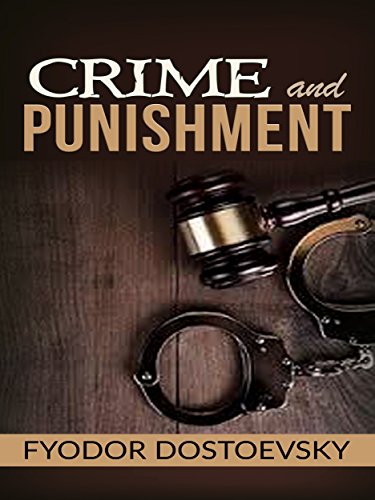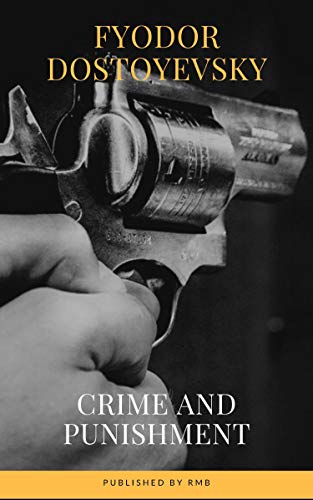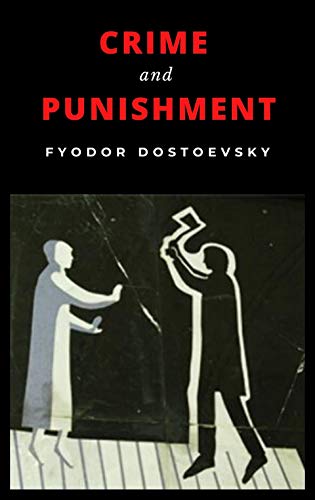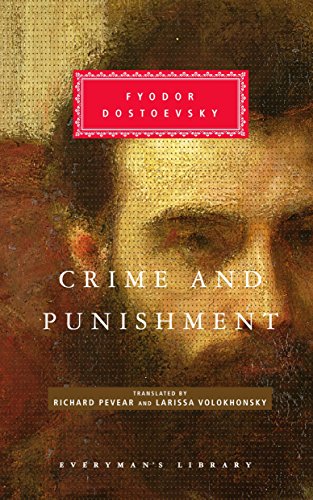-
Crime and Punishment
Fyodor Dostoevsky
eBook (Fyodor Dostoevsky, April 25, 2017)Crime And Punishment, a classic of Fyodor Dostoevsky, tells the story of Raskolnikov, a former wretched and desperate ex-student who wandered through the slums of St. Petersburg and commits casual murder without remorse or regret. Imagine being a great man, a Napoleon: acting for a purpose beyond the conventional moral law. But when he takes a dangerous cat and mouse game with a suspect police detective, Raskolnikov is pursued by the growing voice of his conscience and finds the loop of his guilt that is clinging around his neck. Only Sonya, a stubborn prostitute, can offer a ransom.
-
Crime and Punishment
Fyodor Dostoyevsky
eBook (AmazonClassics, )None
-
Crime And Punishment
Fyodor Dostoyevsky, RMB, Constance Garnett
language (RMB, June 14, 2020)This book contains several tables of HTML content to make reading easier.Through the story of the brilliant but conflicted young Raskolnikov and the murder he commits, Fyodor Dostoyevsky explores the theme of redemption through suffering. "Crime and Punishment" put Dostoyevsky at the forefront of Russian writers when it appeared in 1866 and is now one of the most famous and influential novels in world literature.The poverty-stricken Raskolnikov, a talented student, devises a theory about extraordinary men being above the law, since in their brilliance they think "new thoughts" and so contribute to society. He then sets out to prove his theory by murdering a vile, cynical old pawnbroker and her sister. The act brings Raskolnikov into contact with his own buried conscience and with two characters — the deeply religious Sonia, who has endured great suffering, and Porfiry, the intelligent and discerning official who is charged with investigating the murder — both of whom compel Raskolnikov to feel the split in his nature. Dostoyevsky provides readers with a suspenseful, penetrating psychological analysis that goes beyond the crime — which in the course of the novel demands drastic punishment — to reveal something about the human condition: The more we intellectualize, the more imprisoned we become."Dostoyevsky gives me more than any scientist, more than Gauss." —Albert Einstein"Dostoyevsky wrote of the unconscious as if it were conscious; that is in reality the reason why his characters seem 'pathological', while they are only visualized more clearly than any other figures in imaginative literature... He was in the rank in which we set Dante, Shakespeare and Goethe." —Edwin Muir"The greatest crime novel of all time." —Thomas Mann"'Crime and Punishment' remains the best of all murder stories, a century and a third after its publication. We have to read it — though it is harrowing — because, like Shakespeare, it alters our consciousness." —Harold Bloom
-
Crime and Punishment
Fyodor Dostoyevsky
eBook (Kathartika, July 29, 2020)Through the story of the brilliant but conflicted young Raskolnikov and the murder he commits, Fyodor Dostoyevsky explores the theme of redemption through suffering. “Crime and Punishment” put Dostoyevsky at the forefront of Russian writers when it appeared in 1866 and is now one of the most famous and influential novels in world literature.The poverty-stricken Raskolnikov, a talented student, devises a theory about extraordinary men being above the law, since in their brilliance they think “new thoughts” and so contribute to society. He then sets out to prove his theory by murdering a vile, cynical old pawnbroker and her sister. The act brings Raskolnikov into contact with his own buried conscience and with two characters — the deeply religious Sonia, who has endured great suffering, and Porfiry, the intelligent and discerning official who is charged with investigating the murder — both of whom compel Raskolnikov to feel the split in his nature. Dostoyevsky provides readers with a suspenseful, penetrating psychological analysis that goes beyond the crime — which in the course of the novel demands drastic punishment — to reveal something about the human condition: The more we intellectualize, the more imprisoned we become.
-
CRIME AND PUNISHMENT
FYODOR DOSTOEVSKY
eBook (Ale.Mar., April 22, 2020)Crime And Punishment, a classic of Fyodor Dostoevsky, tells the story of Raskolnikov, a former wretched and desperate ex-student who wandered through the slums of St. Petersburg and commits casual murder without remorse or regret. Imagine being a great man, a Napoleon: acting for a purpose beyond the conventional moral law. But when he takes a dangerous cat and mouse game with a suspect police detective, Raskolnikov is pursued by the growing voice of his conscience and finds the loop of his guilt that is clinging around his neck. Only Sonya, a stubborn prostitute, can offer a ransom.
-
Crime and Punishment
Fyodor Dostoyevsky, Constance Garnett
Paperback (Dover Publications, Aug. 22, 2001)The two years before he wrote Crime and Punishment (1866) had been bad ones for Dostoyevsky. His wife and brother had died; the magazine he and his brother had started, Epoch, collapsed under its load of debt; and he was threatened with debtor's prison. With an advance that he managed to wangle for an unwritten novel, he fled to Wiesbaden, hoping to win enough at the roulette table to get himself out of debt. Instead, he lost all his money; he had to pawn his clothes and beg friends for loans to pay his hotel bill and get back to Russia. One of his begging letters went to a magazine editor, asking for an advance on yet another unwritten novel — which he described as Crime and Punishment. One of the supreme masterpieces of world literature, Crime and Punishment catapulted Dostoyevsky to the forefront of Russian writers and into the ranks of the world's greatest novelists. Drawing upon experiences from his own prison days, the author recounts in feverish, compelling tones the story of Raskolnikov, an impoverished student tormented by his own nihilism, and the struggle between good and evil. Believing that he is above the law, and convinced that humanitarian ends justify vile means, he brutally murders an old woman — a pawnbroker whom he regards as "stupid, ailing, greedy…good for nothing." Overwhelmed afterwards by feelings of guilt and terror, Raskolnikov confesses to the crime and goes to prison. There he realizes that happiness and redemption can only be achieved through suffering. Infused with forceful religious, social, and philosophical elements, the novel was an immediate success. This extraordinary, unforgettable work is reprinted here in the authoritative Constance Garnett translation.A selection of the Common Core State Standards Initiative.
-
Crime and Punishment
Fyodor Dostoyevsky, Alan Munro, Trout Lake Media
Audiobook (Trout Lake Media, Aug. 19, 2013)Dostoyevsky's supreme masterpiece A young student is haunted by the murder he has committed. Overwhelmed afterwards by guilt and terror, he confesses and goes to prison. There he realizes that happiness and redemption can only be achieved through suffering.
-
Crime and Punishment
Fyodor Dostoevsky, Sarah J. Young, Nicolas Pasternak Slater
Hardcover (Oxford University Press, Nov. 12, 2017)"One death, in exchange for thousands of lives - it's simple arithmetic!"A new translation of Dostoevsky's epic masterpiece, Crime and Punishment (1866). The impoverished student Raskolnikov decides to free himself from debt by killing an old moneylender, an act he sees as elevating himself above conventional morality. Like Napoleon he will assert his will and his crime will be justified by its elimination of "vermin" for the sake of the greater good. But Raskolnikov is torn apart by fear, guilt, and a growing conscience under the influence of his love for Sonya. Meanwhile the police detective Porfiry is on his trail. It is a powerfully psychological novel, in which the St Petersburg setting, Dostoevsky's own circumstances, and contemporary social problems all play their part.
-
Crime and Punishment
Fyodor Dostoevsky, Oliver Francis
Hardcover (Macmillan Collector's Library, Jan. 24, 2017)Note: The font size of the text in the book: Plantin, size is 8.5 pt (linefeed is 10.5pt). Crime and Punishment is the story of a brutal double murder and its aftermath. Raskolnikov, a poor student, kills a pawnbroker and her sister, and then has to face up to the moral consequences of his actions. The novel is compelling and rewarding, full of meaning and symbolism, and raises profound questions about the individual and society, and the nature of free will. Translated by Constance Garnett, with an Afterword by Oliver Francis.Designed to appeal to the book lover, the Macmillan Collector's Library is a series of beautifully bound pocket-sized gift editions of much loved classic titles. Bound in real cloth, printed on high quality paper, and featuring ribbon markers and gilt edges, Macmillan Collector's Library are books to love and treasure.
-
Crime and Punishment
Dostoevsky
Paperback (Wordsworth Editions Ltd, Sept. 29, 2000)Introduction and Notes by Dr Keith Carabine, University of Kent at Canterbury Crime and Punishment is one of the greatest and most readable novels ever written. From the beginning we are locked into the frenzied consciousness of Raskolnikov who, against his better instincts, is inexorably drawn to commit a brutal double murder. From that moment on, we share his conflicting feelings of self-loathing and pride, of contempt for and need of others, and of terrible despair and hope of redemption: and, in a remarkable transformation of the detective novel, we follow his agonised efforts to probe and confront both his own motives for, and the consequences of, his crime. The result is a tragic novel built out of a series of supremely dramatic scenes that illuminate the eternal conflicts at the heart of human existence: most especially our desire for self-expression and self-fulfilment, as against the constraints of morality and human laws; and our agonised awareness of the world's harsh injustices and of our own mortality, as against the mysteries of divine justice and immortality.
-
Crime and Punishment
Fyodor Dostoyevsky, Constance Garnett
eBook (Digireads.com, March 30, 2004)"Crime and Punishment" is one of Fyodor Dostoyevsky's most famous novels. First published in 1866, it is the story of Rodion Romanovich Raskolnikov, an impoverished St. Petersburg ex-student who plots to kill an elderly money-lender, Alëna, and profit from her wealth. The murder however does not go as planned and Raskolnikov must suffer the disastrous moral and psychic consequences of his actions. As is common with Dostoyevsky's work, the author brilliantly explores the psychology of his characters, specifically Raskolnikov and what drives him to kill. "Crime and Punishment" is a literary masterpiece and quite simply one of the greatest novels ever written.
-
Crime and Punishment
Fyodor Dostoyevsky, Richard Pevear, Larissa Volokhonsky
Hardcover (Everyman's Library, May 25, 1993)Raskolnikov, an impoverished student living in the St. Petersburg of the tsars, is determined to overreach his humanity and assert his untrammeled individual will. When he commits an act of murder and theft, he sets into motion a story that, for its excruciating suspense, its atmospheric vividness, and its depth of characterization and vision is almost unequaled in the literatures of the world. The best known of Dostoevsky’s masterpieces, Crime and Punishment can bear any amount of rereading without losing a drop of its power over our imaginations.Dostoevsky’s drama of sin, guilt, and redemption transforms the sordid story of an old woman’s murder into the nineteenth century’s profoundest and most compelling philosophical novel.Award-winning translators Richard Pevear and Larissa Volokhonsky render this elusive and wildly innovative novel with an energy, suppleness, and range of voice that do full justice to the genius of its creator.